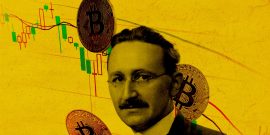Cryptocurrencies have a glittering appeal for anyone looking to escape the control of central banks. Are they fool's gold?
Old Complaints about New Technology
In this Sunday’s New York Times Book Review Leon Wieseltier has polemicized against the digital age. While beautifully written, its major propositions are either wrong or not wholly coherent. All have been heard before in previous ages of technological change. While it is difficult to isolate all the sources of Wieseltier’s distemper, here are four in ascending order of their claim to be taken seriously.
1. Wieseltier claims that “the greatest thugs in the history of the cultural industry” (by which he means Amazon and the like) have destroyed bookstores and record shops. Similarly, journalists now earn less money because of competition from digital platforms. These complaints are the whining of producers displaced by competition that helps consumers. The Amazon and Barnes and Noble websites allow me faster access to a much wider variety of books than the independent bookstores of my youth. And unlike some of these stores, they do not discriminate against books on political grounds. Journalists have no greater claim to be insulated from competition than other professions. And again the web has given range to much more variegated opinion and analysis than the mainstream media of old.
Wieseltier’s complaint resembles nothing so much as those of French publishers of the late eighteenth century who complained to the National Assembly about competitors with cheaper means of production:
We request, sir, that you glance over it and lend all your influence to our demands. From these abuses of the freedom of the press, yet greater abuses have resulted. Countless persons who can barely read have established and maintain shops in every quarter of the capital, hanging over their door their name and the title of Bookseller, which they have no scruple about usurping. We dare to hope, sir, . . . the National Assembly will take the book trade in hand . . . in view of the abuses and thefts as well as the sale of bad books with which France will soon be infected if everyone is free to do business as a bookseller.
2. Wieseltier claims that “the distinction between knowledge and information is a thing of the past” and that this unhappy erasure has been brought about by economists’ insistence on quantification. But in our digital age economists and even non-economists advance knowledge by relentlessly distinguishing between data (i.e. information) and hypotheses. Only confirming the latter gives us knowledge. An emphasis on quantification helps us assess the evidence for various propositions and to distinguish between such persistent confusions as causation and correlation. By using big data we are not erasing the distinction between knowledge and information but deepening the distinction between knowledge and opinion.
3. Wieseltier attacks those who see “global competitiveness” as the highest value of humanity. It is probably those pesky economists again who are responsible for this unhappy event: the whole piece is reminiscent of the attack by Thomas Carlyle, another fine writer, on the economists whom he famously labelled as purveyors of “a dismal science.” Globalization indeed should not be the end of life for itself, but its goods are what any humanist worthy of the name would welcome—the greatest diminishment of grinding and life destroying poverty in human history as more than a billion people in India, China and elsewhere.
4. Wieseltier also asserts that the “processing of information is not the highest aim to which the human spirit can aspire” and that our moral and interior life has claims that cannot be reduced to pixels. And this claim is absolutely true, but I do not think most digital disrupters suggest otherwise. While big data together with hypothesis testing can bring us to a better knowledge of the external world, they cannot create our values and replace our emotional experiences. By our individual use or misuse of technology we can either enrich or impoverish our own inner lives. That choice is the result of the “human agency” on which Wieseltier rightly insists.
It is a confusion to claim that the better knowledge offered by natural science or the greater leisure made possible by markets and technology mean that the enduring issues of honor, of responsibility, of love for others disappear. The nineteenth century Romantic Rebellion against the rise of natural science was wrong about many things, but it was right about this. Even as our technology becomes more powerful, we can continue to “wander lonely as clouds.” Our inner life and moral choices are ever billowing and not able to be captured by digitization, however capacious the cloud of computation becomes.


